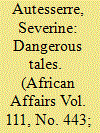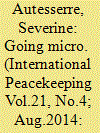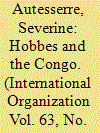|
|
|
Sort Order |
|
|
|
Items / Page
|
|
|
|
|
|
|
| Srl | Item |
| 1 |
ID:
112124


|
|
|
|
|
| Publication |
2012.
|
| Summary/Abstract |
Explanations for the persistence of violence in the eastern part of the Democratic Republic of Congo blame the incendiary actions of domestic and regional leaders, as well as the inefficacy of international peace-building efforts. Based on several years of ethnographic research, this article adds another piece to the puzzle, emphasizing the perverse consequences of well-meaning international efforts. I argue that three narratives dominate the public discourse on Congo and eclipse the numerous alternative framings of the situation. These narratives focus on a primary cause of violence, illegal exploitation of mineral resources; a main consequence, sexual abuse of women and girls; and a central solution, extending state authority. I elucidate why simple narratives are necessary for policy makers, journalists, advocacy groups, and practitioners on the ground, especially those involved in the Congo. I then consider each narrative in turn and explain how they achieved prominence: they provided straightforward explanations for the violence, suggested feasible solutions to it, and resonated with foreign audiences. I demonstrate that the focus on these narratives and on the solutions they recommended has led to results that clash with their intended purposes, notably an increase in human rights violations.
|
|
|
|
|
|
|
|
|
|
|
|
|
|
|
|
| 2 |
ID:
134784


|
|
|
|
|
| Summary/Abstract |
In the past 15 years, scholars have started studying the local and micro-level dimensions of peacekeeping. They have investigated the nature and effectiveness of bottom-up peacebuilding, assessed the local versus national impacts of peacekeeping interventions and studied the decentralized actions of international peacebuilders on the ground. This commentary shows that, despite the approach's limitations, delving into these three topics opens up fruitful areas for further research, in particular analysing micro-to-macro linkages, evaluating peacekeeping's subnational impacts across cases, explaining peacebuilding successes and understanding the causes of peace itself.
|
|
|
|
|
|
|
|
|
|
|
|
|
|
|
|
| 3 |
ID:
090436


|
|
|
|
|
| Publication |
2009.
|
| Summary/Abstract |
Why do international peacebuilders fail to address the local causes of peace process failures? The existing explanations of peacebuilding failures, which focus on constraints and vested interests, do not explain the international neglect of local conflict. In this article, I show how discursive frames shape international intervention and preclude international action on local violence. Drawing on more than 330 interviews, multi-sited ethnography, and document analysis, I develop a case study of the Democratic Republic of Congo's transition from war to peace and democracy (2003-2006). I demonstrate that local agendas played a decisive role in sustaining local, national, and regional violence. However, a postconflict peacebuilding frame shaped the international understanding of violence and intervention in such a way that local conflict resolution appeared irrelevant and illegitimate. This frame included four key elements: international actors labeled the Congo a "postconflict" situation; they believed that violence there was innate and therefore acceptable even in peacetime; they conceptualized international intervention as exclusively concerned with the national and international realms; and they saw holding elections, as opposed to local conflict resolution, as a workable, appropriate, and effective tool for state- and peacebuilding. This frame authorized and justified specific practices and policies while precluding others, notably local conflict resolution, ultimately dooming the peacebuilding efforts. In conclusion, I contend that analyzing discursive frames is a fruitful approach to the puzzle of international peacebuilding failures beyond the Congo.
|
|
|
|
|
|
|
|
|
|
|
|
|
|
|
|
|
|
|
|
|